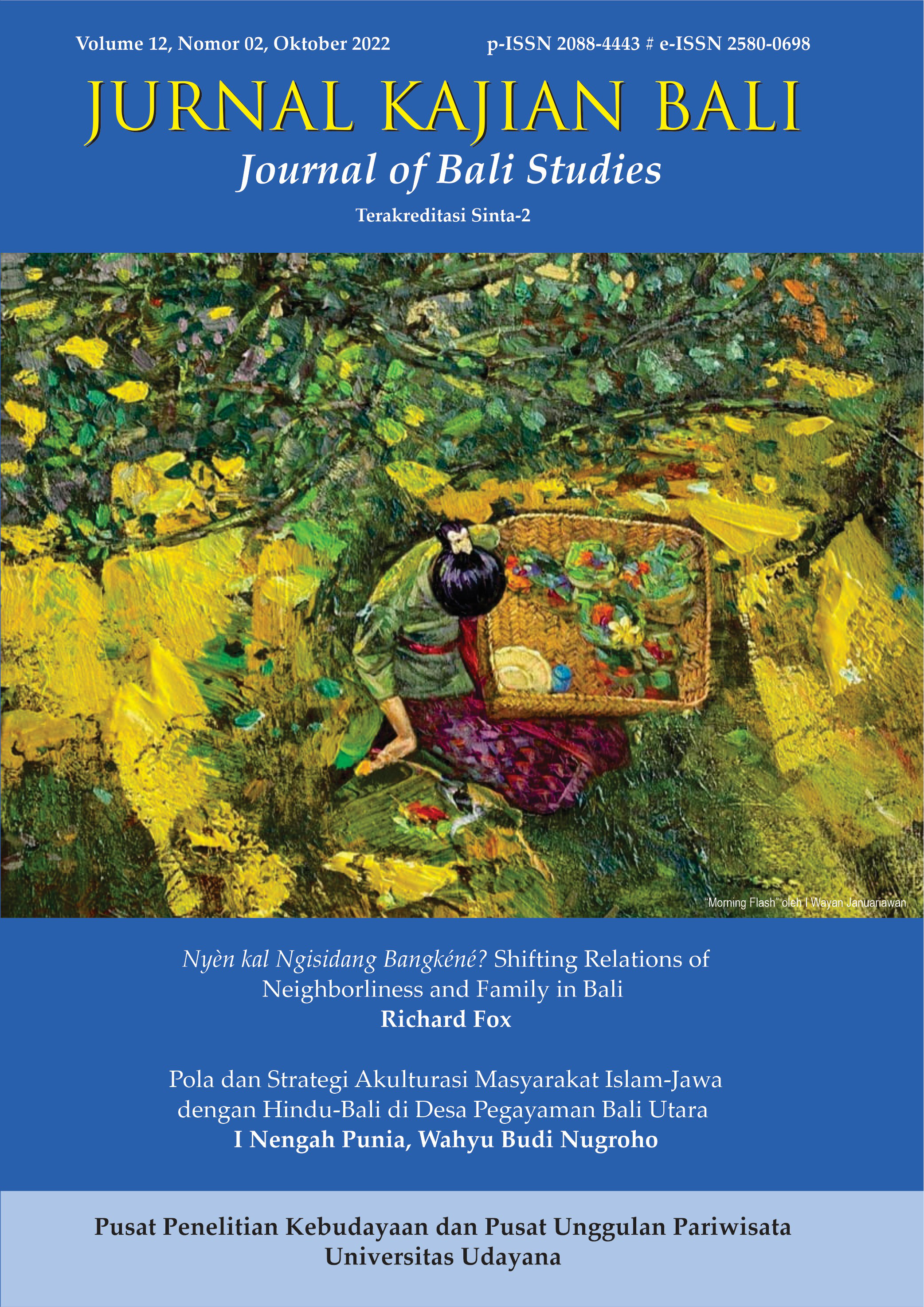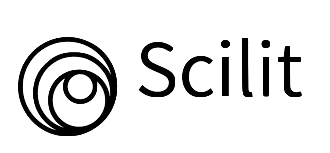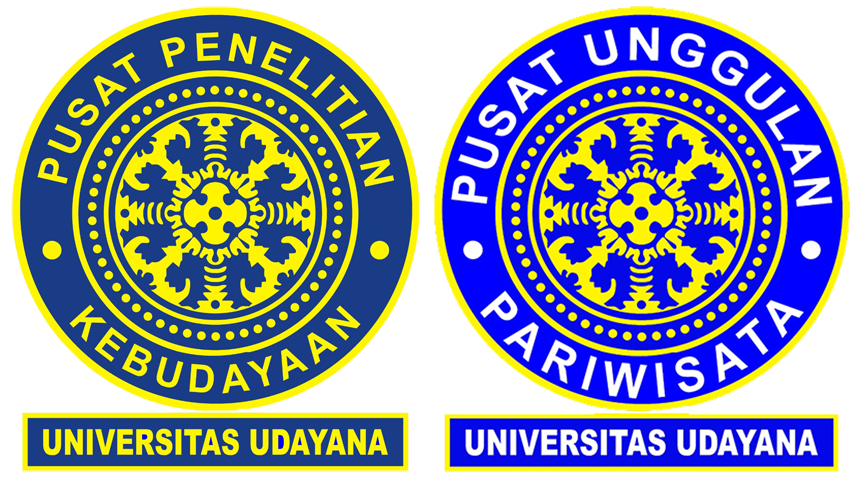Khazanah Ekoleksikon ‘Green’ di Green School Bali
Abstract
The diversity of the language of the environment of Green School Bali needs to be studied, especially the treasury of green ecolexicon as they reflect strategical effort to preserve local wisdom of Balinese culture. This study used a descriptive qualitative approach. Data was obtained from the Green School Bali educational environment by using observation and interviews method. The results shown that the grammatical category of the ‘green’ lexicon is in the form of nouns and verbs that are in the form of basic words and phrases and the ‘green’ syntactic construction at Green School Bali contains these natural lexicons, including noun phrases such as bambu hitam ‘black bamboo’, and verb phrases such as bermain Jegog ‘play Jegog’ while the social praxis dimension of the green ecolexicon namely the ideological dimension, the sociological dimension and the biological dimension. This research also uniquely contributes to preserving the concept of local wisdom in real action in the context of international education in Bali.
Downloads
References
Adnyana, I. K. S. (2020). Verba Bahasa Bali dalam Ranah Perkebunan Kopi: Analisis Metabahasa Semantik Alami. Jurnal Kajian Bali, 10 (23), 441–468.
Alisa, S. (2016). Green School Bali, Sekolah yang Bersahabat Dengan Lingkungan. Retrieved April 20, 2022, from https://idea.grid.id/read/09699648/green-school-bali-sekolah-yang-bersahabat-dengan-lingkungan
Baró, F., Camacho, D. A., Pulgar, Carmen Pérez DelTriguero-Mas, M., & Anguelovski, I. (2021). School greening: Right or privilege? Examining urban nature within and around primary schools through an equity lens. Landscape and Urban Planning, 208(December), 1–11. https://doi.org/10.1016/j.landurbplan.2020.104019.
Budasi, I. G., & Satyawati, M. S. (2021). An Ethnolinguistic Perspective on Lexicons of Traditional House in Menyali Village, North Bali. Jurnal Kajian Bali, 11(1), 115–130.
Bundasgaard, J. & A. V. L. (2000). Dialectical Ecolinguistics. Three Essays for the Symposium 30 years of Language and Ecology in Graz December 2000. Odense: University of Udense.
Deny, A. (2016). Ekoleksikon Maulid Adat Bayan (MAB) Lombok Utara Sebagai Suplemen Bahan Pembelajaran Bahasa Indonesia Berbasis Lingkungan di SMA. RETORIKA: Jurnal Ilmu Bahasa, 2(2), 233–252. https://doi.org/10.22225/jr.2.2.59.233-252
Desiani. (2016). Leksikon, Ungkapan Metaforis, dan Mitos Kebambuan Guyub Tutur Bahasa Bali Dalam Masyarakat Desa Penglipuran, Bangli, Bali: Kajian Ekolinguistik (Tesis). Denpasar: Universitas Warmadewa.
Døør, J., & Jørgen, C. B. (1993). Eco-Linguistics: A Framework. Retrieved from situs: (www.jcbang.dk/main/ecolinguistics/Ecoling_AFramework1993.pdf)
Gaho, R. (2020). What’s Up with Vocabulary and Grammatical Use in News Texts? In Yanthi, K. E. Sukamto, N. S. Kurnia, & C. Manara (Eds.), Konferensi Linguistik Tahunan Atma Jaya 18 Tingkat Internasional (pp. 325–331). Jakarta: Pusat Kajian Bahasa dan Budaya Universitas Katolik Indonesia Atma Jaya. https://doi.org/2549-810X
Gaho, R., & Sari, R. P. (2020). The Existence of Fauna Lexicon in the Elefu Song Lyrics Composed by Hikayat Manaö: Ecolinguistic Study. In International Seminar on Social Science, Humanities, and Education (pp. 29–33). Denpasar: Warmadewa University Press.
Green School, B. (2021). Alumni Stories: Clover Hogan. Retrieved November 4, 2021, from https://www.greenschool.org/bali/bnmag/alumni-stories-clover-hogan/
Kosat, P. M. Y., & Umiyati, M. (2018). Lexicon of Uma Baloko Establishment of Kodi Speech Community of Southwest Sumba. RETORIKA: Jurnal Ilmu Bahasa, 4(2), 113–121. Retrieved from https://doi.org/10.22225/jr.4.2.742.113-121
Kridalaksana, H. (2007). Pembentukan Kata dalam Bahasa Indonesia. Jakarta: Gramedia Pustaka Utama.
Li, J., Steffensen, S. V., & Huang, G. (2020). Rethinking ecolinguistics from a distributed language perspective. Language Sciences, 80, 1–12. https://doi.org/10.1016/j.langsci.2020.101277
Lindø, A. V., & Bundsgaard, J. (2000). Dialectical Ecolinguistics. Nordisk Institut: Research Group for Ecology, Language & Ideology.
Luardini, M. A., Asi, N., & Garner, M. (2019). Ecolinguistics of ethno-medicinal plants of the Dayak Ngaju community. Language Sciences, 74(April), 77–84. https://doi.org/10.1016/j.langsci.2019.04.003
Mbete, A. M. (2013). Penuntun Singkat Penulisan Proposal Penelitian Ekolinguistik. Denpasar: Penerbit Vidia.
Moleong, L. J. (2010). Metodelogi Penelitian Kualitatif. Bandung: PT Remaja Rosdakarya.
Muliana, I. N. (2020). Ideologi di Balik Iklan Komersial Berbahasa Bali. Jurnal Kajian Bali, 10(23), 417–440.
Nawati. (2011). Lingkungan Pendidikan dan Aktivitas Belajar Siswa. Semarang: Universitas Negeri Semarang.
Olsson, D., Gericke, N., Boeve-de Pauw, J., Berglund, T., & Chang, T. (2019). Green schools in Taiwan – Effects on student sustainability consciousness. Global Environmental Change, 54 (November 2018), 184–194. https://doi.org/10.1016/j.gloenvcha.2018.11.011.
Quirk, R., Greenbaum, S., Leech, G., & Svartvik, J. (1985). A Comprehensive Grammar of the English Language. London: Longman. https://doi.org/10.1075/eww.8.1.10wei
Rejistha, I. G. N. A. (2016). Beblabadan Bahasa Bali Dalam Perspektif Ekolinguistik. RETORIKA: Jurnal Ilmu Bahasa, 2(1), 79-94.
Sudaryanto. (2015). Metode dan Aneka Teknik Analisis Bahasa: Pengantar Penelitian Wahana Kebudayaan secara Linguistis. Yogyakarta: Sanata Dahrma University Press.
Triyandana, A., Irawati, M. H., Ibrohim, Susilowati, & Budiasih, E. (2015). Pengembangan Pembelajaran Ekosistem dan Lingkungan Hidup melalui Project-Based Learning untuk Mendukung Urban Farming di SMP. Jurnal Pendidikan Dan Pembelajaran (JPP), 22(2), 130–138.
Umiyati, M. (2020). The Existence of Natural Lexicons in ‘Awig-Awig’ Tenganan Pegringsingan Bali: An Ecolinguistic Approach. Jurnal Kajian Bali, 10(1), 191–216.
Wagstaff, A. (2008). Three Springs. Retrieved April 20, 2020, from https://greenbyjohn.com/three-springs-by-alan-wagstaff/
Widanti, N. P. T. (2014a). 100 Bamboo Marvels. Bali: Yayasan Kulkul.
Widanti, N. P. T. (2014b). Inilah Green School. Bali: Yayasan Kulkul.
Widanti, N. P. T. (2021). Rencana Umum Energi Daerah dalam Perspektif Implementasi Filosofi Tri Hita Karana dan Visi Pemerintah Provinsi Bali. Jurnal Kajian Bali, 11(01), 219–238.
Wira, G., Saputra, A., Mbete, A. M., & Muliana, I. N. (2022). Humor Discourse in Art Performances of Shadow Puppets Cenk Blonk. Austronesian: Journal of Language Science & Literature, 1(2), 56–73.
Wulansari, B. Y. (2019). Pemahaman Konsep “Wall-Less-Ness” dalam Pembelajaran Berbasis Alam di Kindergarten Green School Bali. Jurnal Dimensi Pendidikan Dan Pembelajaran, 7(2), 86–98.
Zeng, X. W., Lowe, A. J., Lodge, C. J., Heinrich, J., Roponen, M., Jalava, P., … Dong, G. H. (2020). Greenness surrounding schools is associated with lower risk of asthma in schoolchildren. Environment International, 143(July), 1–6. https://doi.org/10.1016/j.envint.2020.105967.

This work is licensed under a Creative Commons Attribution 4.0 International License.



















